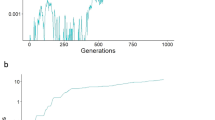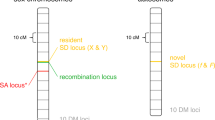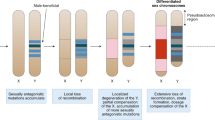Abstract
ALTHOUGH we do not know why sex evolved, the twofold cost of meiosis for females provides a standard against which postulated benefits of sex can be evaluated1. The most reliable benefit is sex's ability to reduce the impact of deleterious mutations2,3. But deleterious mutations may themselves generate a large and previously overlooked female-specific cost of sex. DNA sequence comparisons have confirmed Haldane's suggestion that most mutations arise in the male germ line4,5; recent estimates of α, the ratio of male to female mutation rates, are ten, six and two in humans, primates and rodents, respectively6–8. Consequently, male gametes may give progeny more mutations than the associated sexual recombination eliminates. Here I describe computer simulations showing that the cost of male mutations can easily exceed the benefits of recombination, causing females to produce fitter progeny by parthenogenesis than by mating. The persistence of sexual reproduction by females thus becomes even more problematic.
This is a preview of subscription content, access via your institution
Access options
Subscribe to this journal
Receive 51 print issues and online access
$199.00 per year
only $3.90 per issue
Buy this article
- Purchase on Springer Link
- Instant access to full article PDF
Prices may be subject to local taxes which are calculated during checkout
Similar content being viewed by others
References
Maynard Smith, J. The Evolution of Sex (Cambridge Univ. Press, Cambridge, 1978).
Kondrashov, A. S. Nature 336, 435–440 (1988).
Charlesworth, B. Genet. Res., Camb. 55, 199–221 (1990).
Haldane, J. B. S. Ann. Eugen. 13, 262–271 (1947).
Miyata, T., Hayashida, H., Kuma, K., Mitsuyasu, K. & Yasunaga, T. Cold Spring Harb. Symp. quant. Biol. 52, 863–867 (1987).
Montandon, A. J. et al. Hum. Genet. 89, 319–322 (1992).
Shimmin, L. C., Chang, B. H.-J. & Li, W.-H. Nature 362, 745–747 (1993).
Chang, B. H.-J., Shimmin, L., Shyue, S.-K., Hewett-Emmett, D. & Li, W.-H. Proc. natn. Acad. Sci. U.S.A. 91, 827–831 (1994).
Crow, J. F. in Mathematical Topics in Population Genetics (ed. Kojima, K.) 128–177 (Springer, Berlin, 1970).
Haldane, J. B. S. Am. Nat. 71, 337–349 (1937).
Kimura, M. & Maruyama, T. Genetics 54, 1303–1312 (1966).
Maynard Smith, J. Am. Nat. 102, 469–473 (1968).
Mukai, T. Genetics 81, 749–761 (1969).
Muller, H. J. Mutat. Res. 1, 2–9 (1964).
Kondrashov, A. S. Genet. Res., Camb. 44, 199–217 (1984).
Kondrashov, A. S. & Crow, J. F. Hum. Mutat. 2, 229–234 (1993).
Hamilton, W.D., Axelrod, R. & Tanese, R. Proc. natn. Acad. Sci. USA. 87, 3566–3573 (1990).
Howard, R. S. & Lively, C. M. Nature 367, 554–557 (1994).
Author information
Authors and Affiliations
Rights and permissions
About this article
Cite this article
Redfield, R. Male mutation rates and the cost of sex for females. Nature 369, 145–147 (1994). https://doi.org/10.1038/369145a0
Received:
Accepted:
Issue Date:
DOI: https://doi.org/10.1038/369145a0
This article is cited by
-
Genomic health in an asexual fish
Nature Ecology & Evolution (2018)
-
Examination of boldness traits in sexual and asexual mollies (Poecilia latipinna, P. formosa)
acta ethologica (2011)
-
Mutation accumulation and fitness effects in hybridogenetic populations: a comparison to sexual and asexual systems
BMC Evolutionary Biology (2007)
-
Variation in Sex Ratio and Evolutionary Rate of Hemiclonal Rana esculenta Populations
Evolutionary Ecology (2006)
-
The conservation of redundancy in genetic systems: effects of sexual and asexual reproduction
Journal of Biosciences (2003)
Comments
By submitting a comment you agree to abide by our Terms and Community Guidelines. If you find something abusive or that does not comply with our terms or guidelines please flag it as inappropriate.



